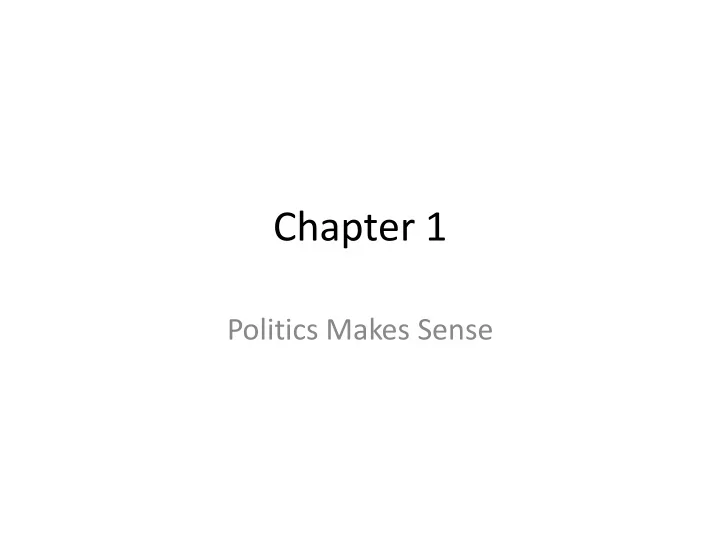

Chapter 1 Politics Makes Sense
Politics makes sense… • …because politics is everywhere – Def: Any process for making “collective decisions” • Decisions that will affect an entire group – Problem: group members frequently disagree on what, if anything, to do
• Dealing with conflict is an essential part of politics – “Successful” politics usually involves discovering a consensus acceptable to “enough” of the group • Compromise is generally necessary – This can be distasteful to some group members
Politics and Governments • Groups of people establish governments to structure their political decision-making – Def: A system for implementing political decisions • Governments define who has what authority – Who decides about taxes? Laws? Wars?
• Governments are often, but not always, spelled out in constitutions – Def: Written or unwritten statements of the organization, powers, and limits of the group’s government and members • Ex: US Constitution, SC Constitution, Fraternity charter, Articles of Incorporation (corporation)
• The formal roles and positions (president, etc.) established by a constitution are called institutions • Generally speaking, what governments do is make policy – decisions, laws, and programs that are meant to solve common problems – How to provide the “best” education to citizens?
Governing is Difficult • Why? 2 main (and simple!) reasons: 1. Coming to a collective decision can be very difficult • Ex: abortion, global warming, gay rights 2. Getting people to work together is also difficult • Even if they agree on what to do!
Collective Action Problems • These basic human difficulties show themselves in a variety of ways, we will examine 2 in particular: 1. Coordination problems 2. Prisoners’ dilemma
The Coordination Problem • As a group becomes larger and more diverse, decision-making becomes more and more difficult. – You knew this already, because you already understand politics, but the coach who taught you government in high school didn’t.
• Large, diverse groups have a more difficult time reaching agreement than small, homogeneous ones. – Ex: Japan vs. United States
The Prisoners’ Dilemma • The PD is a “game” about cooperation – A situation where the outcome depends on the combined choices of all the players • Def: A situation where both players acting in their own best interest results in the worst outcome for the group
• PD story • 2 players, A and B – Each has 2 choices, cooperate (stick to alibi) or defect (confess & implicate partner) • Gives us 4 possible outcomes:
• The moral of the PD is that voluntary cooperation is difficult to accomplish – People rightly try to make the best choices for themselves – Sometimes, those choices have bad consequences for the group • Ex: Free rider problem
Solutions to CAPs 1. Coercion (force) 2. Majority rule 3. Delegation
• Throughout the rest of the semester, we’ll be looking at how the US government tries to resolve these problems – Our unique history, heritage, and needs has lead to a particularly “American” set of answers, one with similarities & differences to those of other countries – To get to the present, we’ve got to go back to the beginning…
Recommend
More recommend